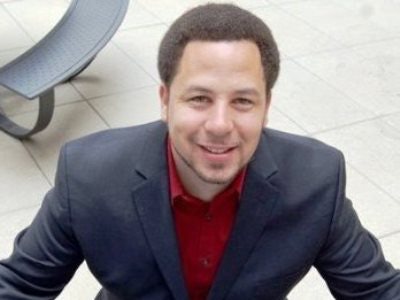 Dr. J. Luke Wood says it’s “critical that faculty do more to facilitate success for young men of color.”
Dr. J. Luke Wood says it’s “critical that faculty do more to facilitate success for young men of color.”Dr. J. Luke Wood and Frank Harris III — two prominent education researchers — have developed a large-scale online professional development training program designed to help faculty at community colleges in California do a better job of teaching young men of color.
The initiative is a partnership between local community colleges and the Center for Organizational Responsibility and Advancement (CORA), an organization that supports the development of educational professionals in advancing their capacity to serve historically underrepresented and underserved students.
The one-week intensive training is designed to equip educators with the tools needed to facilitate relationship building to support men of color in the classroom. It includes video modules, readings, live interactive sessions and learning assessments.
“The strategies we talk about benefit all students, but intensifies the benefits for the success of men of color,” said Wood, who along with Harris focus their research on young Black males. “This program is based upon the research that we’ve been doing. It’s critical that faculty do more to facilitate success for young men of color.”
Wood and Harris developed the program in the response to President Obama’s “My Brother’s Keeper” initiative, a long-term White House strategy that was created to improve the outcomes for boys and men of color. In recent years, the Obama administration has also pushed for new efforts to improve and advance community college student success across the nation.
“We are pleased that colleges are making this program available to their entire faculty,” said Wood, who is an associate professor at San Diego State University and co-director of CORA. “This demonstrates a very serious commitment to redressing equity gaps between men of color and their peers.”
He said that he hopes that the online program will eventually expand beyond California.
Several faculty and college partners said that they were drawn to the program because of the accessibility and flexibility of the online delivery. “Never before has there been a training opportunity in this modality for this population,” said Wendy Stewart, dean of counseling and student development at MiraCosta College. “It’s a great opportunity to reach a large part of our campus community and really elevate understanding and, ultimately, student success.”
In addition to a handful of colleges who have already signed on for their full- and part-time faculty to engage in the training, other colleges are also taking advantage of the program, according to organizers. Merced, Southwestern and Palomar colleges, along with El Camino College Compton Center, have partnered with CORA to support the initiative.
“It is our duty as educators to eliminate the achievement gap and give men of color the opportunity to learn and achieve their dreams,” said Tammi Marshall, a faculty member at Cuyamaca College. “This partnership is a key component in providing Cuyamaca faculty the tools needed to do just that.”
Harris, who is an associate professor of postsecondary education and co-director of the Minority Male Community College Collaborative at San Diego State University, said that the online program empowers faculty to help improve educational outcomes.
“For decades, equity efforts at colleges and universities have sought to ‘fix’ students,” he said. “This online training targets those who perhaps are best positioned to make equitable student success outcomes a reality — classroom faculty.”
Jamal Eric Watson can be reached at [email protected]. You can follow him on Twitter @jamalericwatson.



















